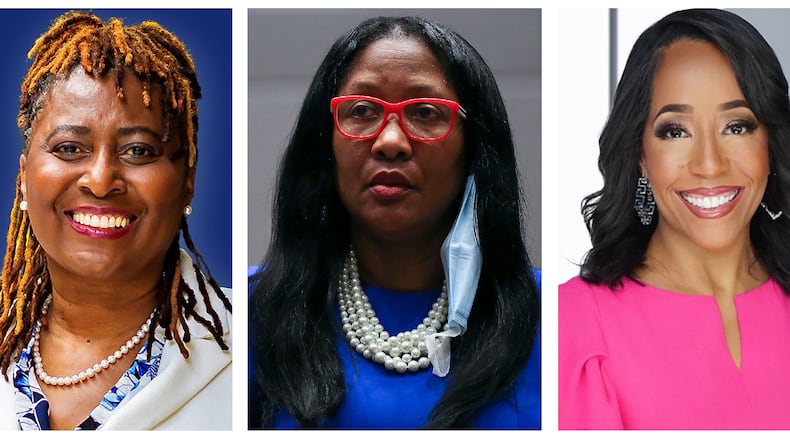The most competitive race for a Fulton County Commission seat is in District 4, where incumbent Democrat Natalie Hall has drawn two primary challengers.
It’s a volatile race, with hopefuls Moraima “Mo” Ivory and Sonya Ofchus criticizing Hall for a sexual harassment legal judgment earlier this year, and a dispute between Ivory and Ofchus on whether a former state representative rescinded an endorsement — and why.
Hall served as chief of staff to former County Commissioner Joan Garner for six years. Following Garner’s death, Hall won a six-way special election to fill out the rest of Garner’s term. She won the seat for a full term in 2020.
Hall did not respond to questions sent by the AJC. On commission, she opposed a proposal to hike the county property tax rate last year. She has generally been a defender of Sheriff Patrick Labat and advocated raises for county employees. In budget talks she has urged putting more money into arts programs and social services. Hall was an instigator of the county’s FACE project, which aims to make Atlanta an arts and fashion center on par with New York and Paris.
In September, other Fulton County commissioners censured Hall following a federal hearing on her affair with a former chief of staff. In that hearing, Hall repeatedly took the Fifth Amendment when asked if she placed tracking devices in the man’s car.
Earlier this year, a federal judge ruled the county was liable in the sexual harassment case, and the county paid more than $900,000 in penalties and costs. Commissioners then cut Hall’s office budget by $200,000 to partially offset the cost of the judgment.
Both Ofchus and Ivory target Hall for the sexual harassment case. Elected officials must adhere to the highest standards of integrity and accountability, Ofchus said.
“I want to be a commissioner because current leadership has become unacceptable,” she said.
Ivory says she is “100%” different from Hall, specifically referring to the ruling. “That’s just not the type of ethical leadership I would bring to the Fulton County Commission.”
But she also accuses Ofchus of lacking integrity, related to a claimed endorsement.
Ofchus put out a campaign flyer, in print and on social media, claiming endorsement from her neighbor: former state Rep. Margaret Kaiser.
Kaiser said she initially supported Ofchus as a neighborly gesture, but made it clear that wasn’t a formal endorsement; and was furious to see herself in Ofchus’ advertising. Kaiser said she demanded a retraction but was met with silence.
“I’m at the point now where (I believe) Sonya Ofchus has no business in elected office,” she said.
Ofchus maintains Kaiser did endorse her but withdrew it under pressure from Commission Chair Robb Pitts, whose influence Kaiser is seeking in a property tax dispute. Ofchus shared texts in which Kaiser says she did not agree to use of her picture in an Ofchus campaign flyer.
Ofchus or her husband apologized via text, saying they would see if they could “stop the spread.”
Kaiser replied that she had to be careful of expressing public support “not only because of my friendship with Chairman Pitts, but that I am actively involved in a County issue he is assisting me with.”
To the AJC, Kaiser acknowledged being “embroiled in an issue right now with the Fulton County tax commissioner that Robb is helping me with,” but said it’s “absolutely untrue” that she faced any pressure or was swayed by Pitts or anyone else.
Pitts, through a spokesperson, said he exerted no pressure on Kaiser to change her opinion of Ofchus and hadn’t heard that it was supposedly related to her tax issue.
Ivory is a law professor at Georgia State University, director of GSU’s Entertainment, Sports and Media Law Initiative. She said she’s a Spelman College graduate, community leader, wife, mother and grandmother, and a 35-year resident of District 4 who brings “a wealth of experience from many different industries,” including two decades of behind-the-scenes work on campaigns, she said.
Ivory ran for an Atlanta City Council seat in 2017.
As a commissioner she would seek to provide better senior services, and — like several other candidates and commissioners — wants to encourage more health providers in the county’s southern half.
“The delivery of quality health care services in this area is really a priority,” Ivory said. That’s a county responsibility, especially in the wake of two hospital closures in 2022, she said.
Ivory said she wants to prioritize criminal justice reform, dealing with a major court backlog and county jail conditions. She would seek to improve tax transparency and promote affordable housing, she said.
Ofchus said she cofounded and served as managing partner of translation firm Host Nation Perspectives SWA from 2010 to 2017. For eight years she has owned and operated L’Amour Chic, a Fayetteville beauty salon.
Ofchus spent 28 years in law enforcement and government, starting as an Atlanta police officer in 1986, serving as a probation officer and special agent for the federal Department of Education’s inspector general, and finally as a postal inspector from 2004 to 2015, according to her campaign website.
She sought an Atlanta City Council seat in 2021, and in 2022 ran in the three-way Democratic primary for Fulton County Commission chair.
Ofchus said she wants to address tax rates, particularly school taxes on older homeowners.
“If you don’t have children, why do seniors have to pay so much school tax?” she said. Boards of education set school district tax rates.
Ofchus said tax officials should provide more public tax education, and seniors’ homestead exemptions should be increased. She also advocates for the county exercising more oversight of mental health programs, encouraging affordable housing and equitable development along the Beltline.
About the Author
Keep Reading
The Latest
Featured


